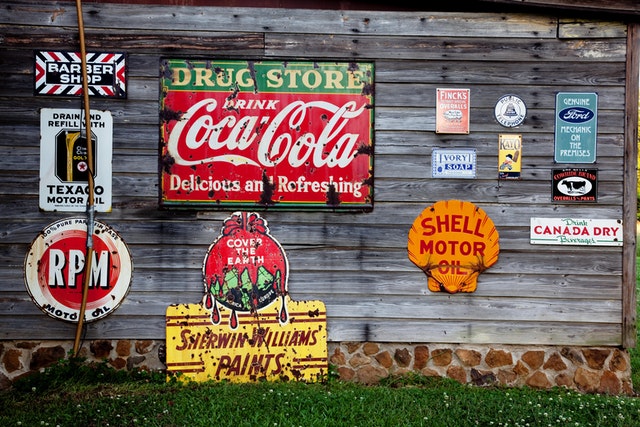Do you use SEO Plugins? What SEO plugins have you used?
At first, I didn’t use any SEO plugins because I was trapped inside WordPress.com.
Once I moved to a better WordPress.com plan, I started using Yoast, since that was the most popular at the time.
I jumped ship as soon as Rank Math entered the race but I got tired of it because it broke my site a few times.
I gave SEOPress a try and I even bought the Premium version of the plugin.
Soon I realized I wasn’t using many of SEOPress’s premium features so I got rid of it.
I gave SmartCrawl a try, it is a great plugin but it seems like there is no team working actively on it.
Then I started Slim SEO, a pretty lightweight plugin, heavily promoted among users who care about site speed and who hate bloated plugins.
I gave SmartCrawl another chance and SEOPress another try and I opted to keep SEOPress.
This is my SLIM SEO Review
Table of Contents
Why Slim SEO?
There are two things I hate when it comes to SEO plugins.
- I hate paying for plugins that offer 99 features, of which I use 5 of them.
- I hate keeping a free plugin when I know that I am not making the most out of it.
Slim SEO doesn’t fall into any of those two categories because it has the basic features to take care of the technical SEO aspects
Slim SEO Review
Slim SEO doesn’t have as many options as Rank Math and SEOPress do since they have never wanted to be an SEO Swiss Army Knife.
These are the main features that you will find in SEOPress
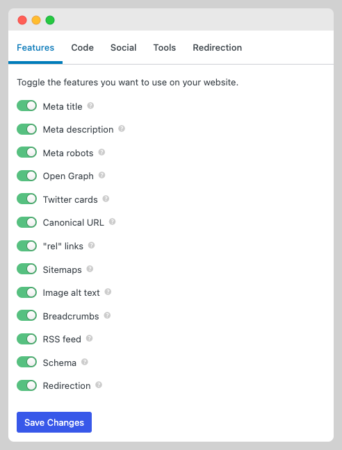
I don’t use the code, socials, tools, or redirections at all.
Meta Titles (1)
I don’t really pay much attention to the meta titles when I am using SEO Plugins.
I write a title for my posts and that’s the title that is shown in the SERP’s
Note: If you want to get your hand a little bit dirty, custom fields and a couple of code snippets can help output the meta title in your source code.
Meta Description (2)
On some sites, I have taken some time to write meta descriptions and I wouldn’t like to lose all that work.
Ahrefs has this to say about meta descriptions:
Meta descriptions aren’t a ranking factor
25.02% of top-ranking pages don’t have a meta description
Google rewrites meta descriptions 62.78% of the time
Relevant and compelling meta descriptions entice clicks
How Often Does Google Rewrite Meta Descriptions?
If you are not writing meta descriptions, you can deactivate and delete Slim SEO knowing that you can install it back in the future with the certainty that nothing will be lost.
If you don’t write meta descriptions, Search Engines will show the first few lines of your posts.
Note: If you want to get your hand a little bit dirty, custom fields and a couple of code snippets can help output the meta title
Meta Robots (3)
A robot meta tag is an HTML snippet that tells search engines how to crawl or index a certain page.
Slim SEO automatically checks if a page needs to be indexed and auto-excludes it from the search results if necessary.
| #1 | 404 page |
| #2 | Search results pages |
| #3 | Private singular pages/posts |
| #4 | Empty Categories and Tags |
| #5 | Feed |
Meta Tags are something I am not worried about. I understand that complex sites might find a feature like this useful but I don’t really need it.
Note: All content I write has the intention to rank so I am not worried about meta robots. I have removed all pages generated by WordPress that I don’t want to rank.
Open Graph and Twitter Cards (4,5)
I don’t use social media like I used to do.
Some say that social networks like Facebook or Twitter are dying and video content and short videos are taking over.
Note: There are code snippets that you can add to the functions.php file which can help you generate the open graph without much complication.
Canonical URL’s (6)
Canonicalization is the process that search engines use to determine the main version of a page.
You can learn more about canonization by reading this Ahrefs Article
I have identified some pages that haven’t been indexed thanks to the post having a canonical URL
You can check what Google is indexing in the coverage section from your Google Search Console account.
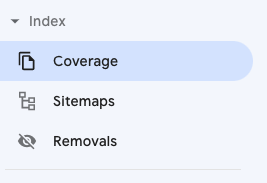
Note: This is not complicated to do with a code snippet but the canonical tag is present in the source code. I verified it using this website.
Rel Links (7)
In HTML (HyperText Markup Language), a rel attribute (short for “relationship”) is used to specify the relationship between the current document and the linked document.
Does this have to do with the way external links should be treated?

Note: I still don’t know what to make of this feature.
Sitemaps (8)
WordPress has sitemaps and you can customize them to make them work the same way the sitemaps created by SEO plugins do.
Native WordPress sitemaps don’t add the last modified date to posts and pages by default. You can fix that with a few lines of code.
Note: Native sitemaps are fine.
IMG Alt Tags (9)
Alt tags, also known as “alternative text,” are a way to describe the contents of an image on a webpage.
ALT Tags are used to provide a text description of an image for the benefit of users who are unable to see the image due to a visual impairment, or for users who are using a device that cannot display images.
I am not that concerned about ALT Tags, I always forget to write them.
I appreciate that SLIM SEO does that for me automatically.
Note: I wouldn’t keep a plugin for the whole purpose of adding ALT Tags automatically. I have written an alternative text to most of the images on the sites I truly care about.
Breadcrumbs (10)
Breadcrumb navigation stands for internal links that give users and search engines a clear trail to follow around your site
I don’t add Breadcrumbs because I think they are needed by the visitors, my content sites tend to be simple.
I only keep the breadcrumbs feature activated so the code gets validated on Google Search Console
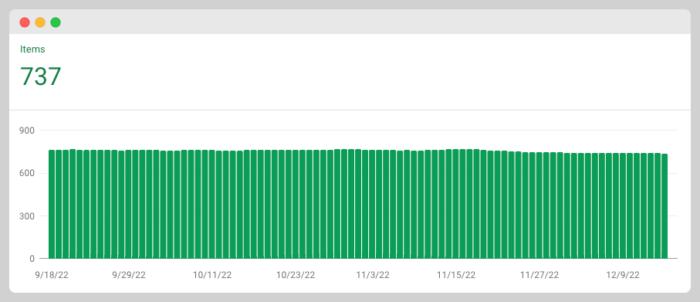
If you want to learn more about the impact Breadcrumbs have in SEO, check this post by Search Engine Journal.
Note: I haven’t found a way to add breadcrumbs without the help of a plugin.
RSS Feed (11)
In WordPress, an RSS feed is a way to syndicate your website’s content so that it can be displayed on other websites or in feed readers.
I deactivated all my RSS feeds since content scrappers visit them often.
Note: This code snippet will help you deal with RSS Feeds
SLIM SEO: Schema (12)
I don’t know if the basic schema for posts has a huge impact on search results.
I usually enable basic schema because I prefer having something rather than nothing.
Some experts claim that basic schema won’t boost your SEO so I don’t really know if is worth the effort.
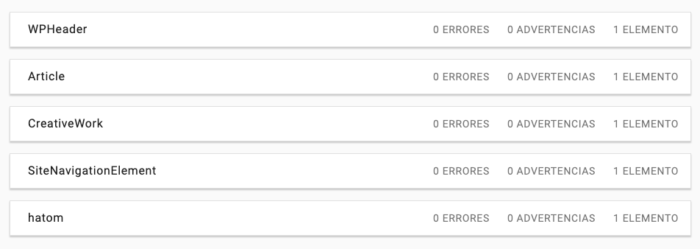
I implement basic schema because Google Search Console keeps track of it.
Slim SEO has a schema plugin in case you want to improve your schema game.
Note: I found a way to implement basic schema markup to all posts and pages using code snippets.
Redirections and Auto Redirections (13)
This is what autoredirection does:
When you upload any file to WordPress, WordPress creates an attachment page for that file. This page provides very little information about the file and the page looks quite empty. As search engines already index the files, allowing attachment pages to be indexed make duplicated content and increase the bounce rate. It’s better to disable the attachment pages.
If the website has only one author, then the author page is almost the same as the blog page or homepage. Indexing the author page makes duplicated content and provides no value to the users. So Slim SEO auto redirects this author page to the homepage.
Another case is if authors have no posts, their page will be empty. Thus, indexing them is bad for SEO. In this case, Slim SEO also redirects these pages to the homepage.
Auto Redirection
About Redirections, I can say:
- I don’t keep track of 404 errors and when I do, it is to build my custom Cloudflare Firewall
- I use Cloudflare for redirections but I rarely create redirections.
- I don’t force trailing slashes but URLs without trailing slashes are redirected to the URLs with a trailing slash. That is supposed to be done by WordPress automatically.
- I don’t redirect www to the non-www version of my site but it is done automatically. Test and see if WordPress is taking care of this.
Note: There are code snippets to help you with the basic features found in this section. This is the one for redirecting attachment pages and this is the code snippet you need for redirecting author pages. Don’t link to author pages anywhere on your site, if you don’t want search engines to crawl them.
Love it or Leave it?
Why not love Slim SEO? Why leave it?
Sometimes I have lots of free time and this is like a game. It also makes me learn new things.
To remove SLIM SEO from all my sites, I have to make sure I don’t need these features or I need to find a replacement for them.
The replacement must be code snippets because I don’t want to move from one plugin to another plugin.
| Feature | Status | |
| #1 | Meta Title | Solved |
| #2 | Meta Description | Solved |
| #3 | Meta Robots | Solved |
| #4 | Open Graph | Solved |
| #5 | Twitter Card | Solved |
| #6 | Canonical URL | Solved |
| #7 | “REL Links” | Solved |
| #8 | Sitemaps | Solved |
| #9 | Image ALT Tags | Solved |
| #10 | Breadcrumbs | Solved |
| #11 | RSS Feed | Solved |
| #12 | Schema | Solved |
| #13 | Redirections | Solved |
Final Thoughts
We are used to using complex plugins with lots of functionalities and that makes us wonder if an SEO plugin with a minimalistic approach will be enough.
If you don’t want to spend hours tweaking settings, SLIM SEO will take care of the basics for you.
You can even argue that bloated SEO plugins don’t equal better rankings.
I try to use lightweight plugins and plugins with the less bloat possible, if you think like me, then you should give Slim SEO a try.
You can also try to code your way out of SEO Plugins City.
![I didn’t get my Adsense Payment [Solved]](https://wpsurfer.com/wp-content/uploads/2022/07/Where-is-my-money.jpeg)
